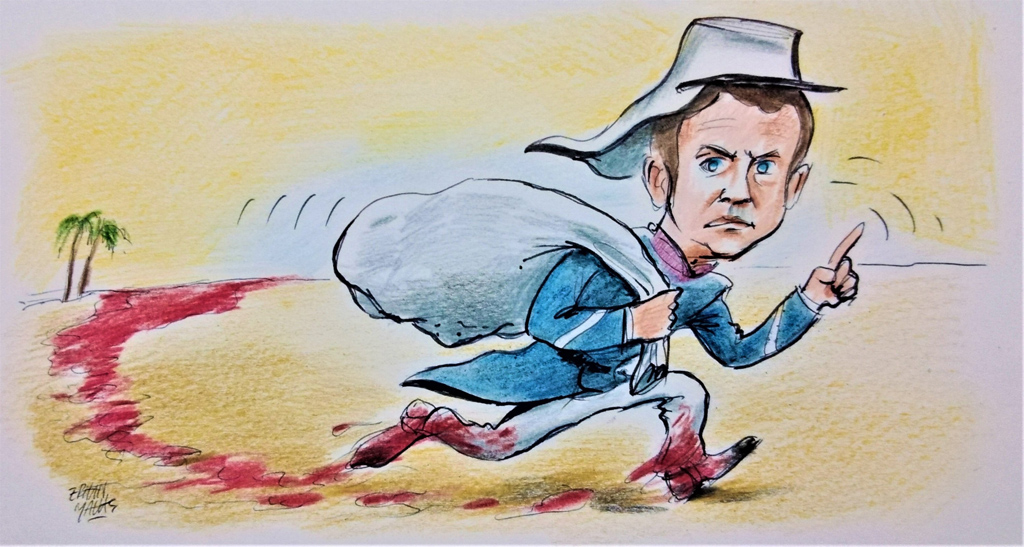I believe those two adjectives perfectly capture
French President Emmanuel Macron’s state of mind.
Addressing a group of young people ahead of the COP27 Summit in Egypt, Macron charged China, Russia and Türkiye with colonialism and imperialism. In a clumsy attempt to push back against the African critique of France as a colonial power, he claimed that the Chinese, the Russians and the Turks were behaving “ten times worse” than the French and others in Africa.
Let us focus on the French president’s combativeness before dealing with his brazenness.
Having secured a second term in office, Macron aspires to become Europe’s leader. He originally thought that former German Chancellor Angela Merkel’s retirement from politics created an opportunity for him, yet his repeated attempts proved futile.
U.S. President Joe Biden was the first foreign leader to let the French president down, as Washington’s security and defense pact with Australia and the United Kingdom voided a $90-billion defense agreement between France and Australia. Later, President Recep Tayyip Erdoğan targeted Macron for showing up in the Eastern Mediterranean in collaboration with Greece.
More recently, the French president’s attempt to portray himself as a skilled diplomat was foiled by a photograph showing him sitting across an unusually long table from Russian President Vladimir Putin, whom Macron requested to meet over Moscow’s invasion of Ukraine. Ironically, Putin repeatedly contacted Erdoğan during the same period, showing all foreign leaders, including Macron, whom he considered his counterpart. The grain deal and the prisoner exchange, too, attested to that fact.
Germany's apathy
To make matters worse for Macron, Germany's recently-elected Chancellor Olaf Scholz has been pursuing an independent policy on European defense and the energy shortage. Keeping in mind that the Ukraine war impacted the German economy more than others, it makes sense that Scholz does not really think about the French president. In recent months, several Franco-German meetings have been canceled and the German leader unveiled a 200 billion euro energy relief package without notifying Macron. Berlin also stopped working on the Franco-German Tiger helicopter, canceled joint navy drills, and concluded an agreement with 13 NATO countries to build an air- and missile defense shield.
The most recent step that Scholz took despite the French president was his visit to China. Whereas Macron had offered to visit Beijing together, the German chancellor opted to visit China with a group of German businesspeople.
All those developments indicate that Macron is unlikely to fulfill his ambition of leading the European Union.
Olaf Scholz is charting a new course for Germany’s foreign policy and wants to pursue a more autonomous policy toward China (and possibly Russia), unlike the United States, Britain and France.
Turkish presence in Africa
As for Macron’s brazenness: Obviously, that issue is closely linked to France’s inability to confront its colonialist past. As his country becomes less and less influential in world politics, the French president makes accusations against some of the most prominent players in Africa.
For the record, this is not unprecedented. In August 2022, Macron
accused China, Russia and Türkiye of colonialism and hostility toward France during a trip to Algeria. Let us recall that the Algerian presidency had strongly criticized him for comparing that country’s French and Turkish heritage in October 2021: “Macron’s comments represent an unacceptable insult against the 5,630,000 martyrs that sacrificed themselves (between 1830 and 1962) during a courageous resistance against French colonialism.” The Algerians, meanwhile, responded to Macron’s comments on Türkiye by saying that “the Turks invested $5 billion in Algeria without any political expectations. Those (nations) that are unhappy with our relations should come and invest here.”
In truth, Algeria’s remarks reflect how African nations feel about
the Turkish presence in Africa. Furthermore, the following point – which President Erdoğan said African leaders made during his tour of Angola, Togo and Nigeria – explains what distinguishes Türkiye’s African outreach from other countries: “At this point, your trips here arrest (sic.) the West’s relations with Africa.”
Using that verb highlights the evil nature of the West’s colonial past and the West’s continued commitment to that approach. Again, Türkiye’s policy in Africa is about “winning together” and “going forward together,” which represents an alternative to the continent’s relations with the West (including France), China and Russia.
[Daily Sabah, November 09 2022]







